ISRAEL’S SECRET NUCLEAR AMBITIONS: DECEPTION, THEFT, AND JFK’S NIGHTMARE
Israel’s recent military actions against Iran’s nuclear facilities have reignited global debates about nuclear proliferation in the Middle East. While Israel accuses Iran of pursuing nuclear weapons—without concrete evidence—its own history of secretly developing nuclear arms, allegedly through deception and theft, casts a long shadow. A particularly chilling chapter involves Israel’s reported efforts to mislead President John F. Kennedy and steal highly enriched uranium from the United States to fuel its clandestine nuclear program. Drawing on historical records, declassified documents, and insights from CIA veteran Larry Johnson, this article explores how Israel’s nuclear ambitions clashed with JFK’s non-proliferation agenda and the murky events surrounding the theft of U.S. uranium.
JFK’s Battle Against Israel’s Nuclear Program
In the early 1960s, President John F. Kennedy was deeply concerned about the spread of nuclear weapons, viewing proliferation as a “private nightmare” that could destabilize global security. His administration prioritized preventing nations, including allies, from acquiring nuclear capabilities. Israel, a close U.S. partner, became a focal point of this policy due to its secretive nuclear activities at the Dimona reactor in the Negev Desert.
In May 1961, JFK met with Israeli Prime Minister David Ben-Gurion in the United States to address these concerns. Ben-Gurion insisted that the Dimona facility was for peaceful research, assuring Kennedy that Israel had no intention of developing nuclear weapons. However, U.S. intelligence painted a different picture. An October 1961 National Intelligence Estimate (NIE) from the CIA warned that Israel was on track to produce enough weapons-grade plutonium for one or two crude nuclear weapons annually by 1965–66. This assessment heightened JFK’s resolve to curb Israel’s nuclear ambitions.
Kennedy pushed for regular inspections of Dimona by the International Atomic Energy Agency (IAEA) and exerted diplomatic pressure on Israel to abandon its military nuclear program. According to Glenn Seaborg, then-chairman of the Atomic Energy Commission, Kennedy’s commitment to non-proliferation was unwavering, and he viewed Israel’s potential nuclear arsenal as a direct threat to global stability. However, Israel’s evasive responses and limited cooperation with inspections frustrated U.S. efforts, setting the stage for a covert operation that would further strain U.S.-Israel relations.
The NUMEC Uranium Theft Scandal
Central to the controversy is the disappearance of over 300 kilograms of highly enriched uranium (HEU), specifically uranium-235 (U-235), from the Nuclear Materials and Equipment Corporation (NUMEC) plant in Apollo, Pennsylvania, between 1958 and 1978. The theft was first detected in 1965 during a routine inventory check, prompting a multi-agency investigation involving the CIA, FBI, and Atomic Energy Commission that spanned from 1965 to the early 1980s.
NUMEC, a private company contracted to process nuclear materials for the U.S. government, was co-founded by Zalman Shapiro, a chemist with known ties to Israel. The missing uranium was significant—enough to produce several nuclear weapons. In 1968, the CIA reportedly detected traces of HEU, chemically traceable to the U.S., near Israel’s Dimona nuclear complex, raising suspicions that the stolen material had been diverted to Israel’s nuclear program.
Declassified CIA documents, released in 2015, provided further evidence of this diversion. A 1970s CIA report concluded that the NUMEC uranium had likely been transferred to Israel, though the exact mechanism—whether through espionage, smuggling, or other means—remained unclear. Despite these findings, the U.S. government did not publicly confront Israel, opting instead for a policy of “strategic ambiguity” regarding Israel’s nuclear capabilities. This opacity has persisted, with neither the U.S. nor Israel officially acknowledging the theft or Israel’s nuclear arsenal, estimated today to include 80–200 warheads.
Israel’s Motive and JFK’s Assassination
CIA veteran Larry Johnson has suggested that Israel’s nuclear ambitions may have given it a motive to view JFK as an obstacle. Kennedy’s insistence on inspections and his broader non-proliferation agenda threatened to derail Israel’s strategic goal of achieving nuclear deterrence. While no definitive evidence links Israel to JFK’s assassination in November 1963, Johnson’s remarks highlight the tensions between the two nations at the time. The assassination, just months after Kennedy’s renewed pressure on Israel, abruptly ended U.S. efforts to closely monitor Dimona, and subsequent administrations adopted a more lenient stance toward Israel’s nuclear program.
Broader Implications and Israel’s Nuclear Opacity
Israel’s nuclear program, built in part through deception and the alleged theft of U.S. materials, underscores the complexities of U.S.-Israel relations. While Israel has neither confirmed nor denied possessing nuclear weapons, its policy of ambiguity has allowed it to maintain a strategic advantage in the Middle East while avoiding international scrutiny. The U.S., despite evidence of the NUMEC theft, has refrained from pressing Israel, likely to preserve the alliance and avoid destabilizing the region.
Meanwhile, Israel’s recent attacks on Iran’s nuclear sites—conducted without proof of Iran’s weaponization—highlight a double standard. Israel’s own nuclear arsenal, developed in secrecy, has never faced the same level of international condemnation or intervention. This disparity fuels accusations of hypocrisy and complicates efforts to achieve a nuclear-free Middle East.
Conclusion
The story of Israel’s nuclear program, marked by alleged deception and the theft of U.S. uranium, reveals a troubling chapter in the history of U.S.-Israel relations. President Kennedy’s efforts to halt Israel’s nuclear ambitions were met with resistance and evasion, while the NUMEC scandal exposed vulnerabilities in U.S. nuclear security. Declassified documents and CIA findings confirm that Israel likely benefited from stolen uranium, yet the U.S. has maintained a policy of silence, prioritizing geopolitical alliances over transparency.
As Israel continues to challenge Iran’s nuclear activities, its own clandestine nuclear history serves as a reminder of the challenges in enforcing non-proliferation. Moving forward, a consistent and transparent approach to nuclear oversight is essential to fostering trust and stability in the region.





